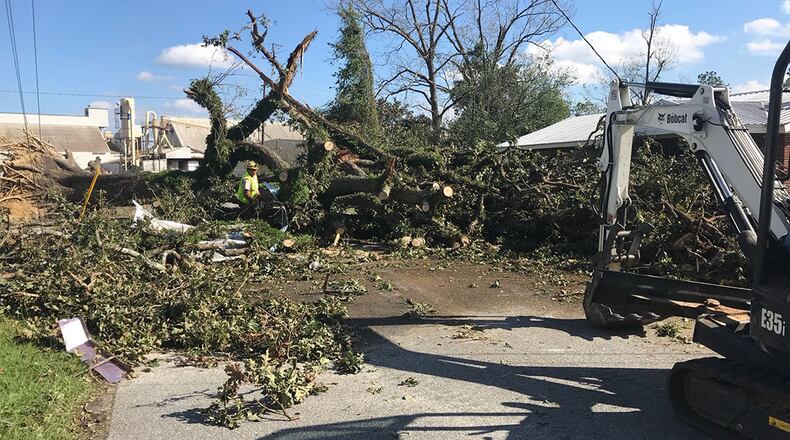The House sent President Donald Trump a long-delayed disaster aid package on Monday that would free up more than $19 billion for the victims of Hurricane Michael and other recent natural disasters, effectively ending a political saga that broke records for gridlock on Capitol Hill and caused months of pain for countless Americans, from farmers in Georgia to hospital patients in Puerto Rico.
Lawmakers passed the legislation 354 to 58, following the Senate’s bipartisan vote last month. The measure now heads to the president, who said he will sign it.
The bill’s passage, coming 236 days after Michael crossed into Georgia, was met with relief by elected officials in the state from both sides of the aisle, many of whom had grown angry and disillusioned by Washington’s historic delay in reaching a compromise.
“Today, Congress finally put hardworking Americans first by advancing the disaster relief package,” said Gov. Brian Kemp, who is planning to soon visit with South Georgia farmers who were hit by the storm in October. “I applaud President Trump for his support and the Georgia delegation for their tireless efforts. Together, we will rebuild South Georgia and keep our great state moving in the right direction.”
The partisan bickering that preceded the House vote — over a problem everyone agreed urgently needed to be fixed — portends just how difficult it will be for Congress and the administration to get anything of substance done in the lead-up to the 2020 elections. Until a few years ago, emergency assistance bills for natural disaster victims were considered essentially nonpartisan.
And the bill's delay will also almost certainly linger as a campaign issue in Georgia, where U.S. Sen. David Perdue's top Democratic challenger has already used it to question the Republican's effectiveness.
Fits and starts
Party leaders had been trying to pass disaster relief money in one form or another since December, when Congress was negotiating with the White House on a broader government funding package to avoid a shutdown.
Perdue and Georgia U.S. Sen. Johnny Isakson thought they'd found a breakthrough in late February when Trump agreed to sign off on $600 million in nutrition assistance for Puerto Rico. The money is what had caused talks for all pending disaster assistance — which included rebuilding money for communities hit by Hurricane Michael, California wildfires and other recent storms across the country — to collapse during the shutdown.
But Senate Democrats rejected the offer, saying Puerto Rico needed more money as it struggled to recover from 2017's Hurricane Maria.
Then Trump got involved, stirring up new resistance to the measure. The president said the Puerto Rican government had previously been an ineffective steward of taxpayer money and didn’t deserve any more. That essentially tied the hands of GOP lawmakers — including many from Georgia — who didn’t want to face the wrath of the president and his loyal supporters.
Throughout the seven-month fight, the parties stayed remarkably unified, even as the state's top GOP officials publicly agitated for a deal back at home. The only Georgia Republican who opted to criticize the administration was U.S. Rep. Austin Scott, R-Tifton, whose south-central congressional district was pummeled by Michael.
The legislation eventually gained the dubious distinction of being Congress’ longest-stalled disaster relief bill, surpassing the bitter fight to approve aid money following 2012’s Hurricane Sandy.
A deal emerges
As pressure mounted from constituents, senators emerged with a $19.1 billion deal somewhat unexpectedly in late May. Key to the agreement was a pledge Perdue helped extract from his White House ally to drop his demands for unrelated border money and accept the compromise.
The deal easily cleared the Senate, but three attempts to quickly pass it through the House — which was already adjourned for its Memorial Day recess — without a roll call vote were blocked by individual Republican lawmakers in the 10 days that followed.
The legislation includes more than $3 billion for farmers hit by Hurricane Michael and other recent storms, as well as money for local blueberry growers whose crops were destroyed by a deep freeze in 2017 and the victims of recent tornadoes in west Georgia and Alabama.
“I am so pleased that we could come together to help our farmers recover after Hurricane Michael,” said U.S. Rep. Rob Woodall, R-Lawrenceville. “Going forward, Congress needs to put politics aside and work together on bipartisan solutions that will help communities that need it the most.”
Even with the package headed toward Trump’s desk, it will still take weeks — if not months — for any aid money to end up in the pockets of needy Georgians. The funding must first filter through dozens of federal agencies, including the Army Corps of Engineers, the Department of Agriculture and the Environmental Protection Agency.
For some Georgia farmers, Washington's emergency money is too little, too late.
The planting season for many Southeastern crops began months ago, and some farmers still reeling from Michael were forced to make their financial decisions then. Some mortgaged off farm acreage in order to obtain bank loans. Others decided to delay planting — or to sit out of the 2019 season entirely.
Stay on top of what's happening in Georgia government and politics at www.ajc.com/politics.
About the Author
Keep Reading
The Latest
Featured




